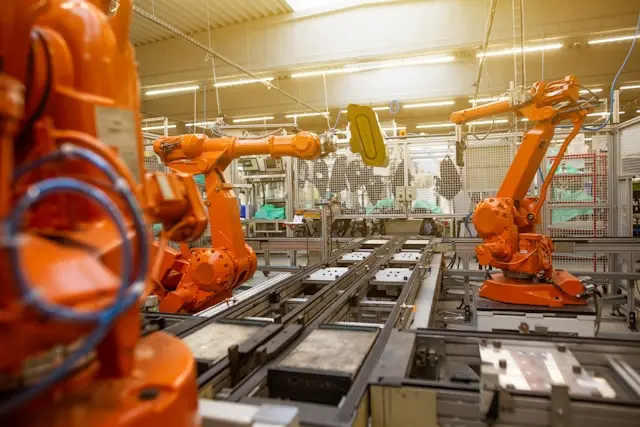Humanizing Customer Communication Automation in the Supply Chain
Customer communication automation is a crucial aspect of modern supply chain management. It involves sending automated notifications to customers at various stages of the delivery process, such as order confirmation, shipment tracking, and delivery confirmation. These notifications can be customized based on customer preferences, ensuring a personalized and efficient communication experience.
Traditionally, customer communication in the supply chain has been a manual and time-consuming process, prone to errors and inconsistencies. However, with the advent of Python, AI, and cloud-based solutions, businesses can now automate this process, leading to significant improvements in efficiency, accuracy, and customer satisfaction.
Benefits of Customer Communication Automation
- Improved customer experience: Automated notifications provide real-time updates on order status, shipment tracking, and delivery details, enhancing customer visibility and satisfaction.
- Increased efficiency: Automation eliminates manual tasks, freeing up staff to focus on more strategic initiatives and value-added activities.
- Reduced costs: Automation streamlines communication processes, reducing operational expenses associated with manual communication.
- Enhanced accuracy: Automated systems minimize errors and inconsistencies, ensuring accurate and reliable communication with customers.
- Personalized communication: Automation allows for customized notifications based on customer preferences, fostering stronger relationships and loyalty.

Customer Communication Automation with Python, AI, and Cloud
Python, AI, and cloud-based solutions play a pivotal role in revolutionizing customer communication automation in the supply chain.
Python for Unattended and Attended Bots
Python’s versatility allows for the development of both unattended and attended bots for customer communication automation.
- Unattended bots: These bots can operate independently, handling repetitive tasks such as sending order confirmations, shipment tracking updates, and delivery notifications.
- Attended bots: These bots assist human agents by providing real-time information and automating specific tasks, enhancing agent productivity and customer service.
Cloud Platforms as Automation Orchestrators
Cloud platforms offer a comprehensive suite of features and capabilities that surpass traditional RPA/workflow tools. They provide:
- Scalability: Cloud platforms can seamlessly scale to meet fluctuating demand, ensuring uninterrupted automation.
- Reliability: Cloud platforms offer high availability and fault tolerance, minimizing downtime and ensuring consistent performance.
- Integration: Cloud platforms easily integrate with other applications and systems, enabling end-to-end automation.
AI for Enhanced Accuracy and Edge-Case Handling
AI techniques can significantly enhance the accuracy and efficiency of customer communication automation.
- Image recognition: AI can analyze images of product shipments to verify their condition and identify any potential issues.
- Natural language processing (NLP): NLP enables bots to understand and respond to customer inquiries in a natural and human-like manner.
- Generative AI: Generative AI can create personalized communication tailored to each customer’s preferences and needs.
By leveraging Python, AI, and cloud-based solutions, businesses can achieve intelligent and humanized customer communication automation in the supply chain, leading to improved customer satisfaction, operational efficiency, and cost savings.

Building Customer Communication Automation with Python and Cloud
Building customer communication automation in the supply chain using Python and cloud involves the following steps:
1. Process Analysis
Analyze the existing customer communication automation processes, including order confirmation, shipment tracking, and delivery confirmation. Identify the steps, stakeholders, and data involved in each process.
2. Automation Design
Design the automation architecture using Python and cloud services. This includes selecting the appropriate Python libraries, cloud functions, and data storage mechanisms.
3. Data Integration
Integrate the automation system with the relevant data sources, such as order management systems, shipping carriers, and customer relationship management (CRM) systems.
4. Bot Development
Develop Python bots using libraries such as Selenium, RPA Framework, or UiPath to automate the identified processes. These bots can be unattended or attended, depending on the requirements.
5. Deployment
Deploy the automation system to the cloud platform, ensuring scalability, reliability, and security.
Data Security and Compliance
Data security and compliance are paramount in customer communication automation. Python and cloud platforms provide robust security features to protect sensitive customer data.
Advantages of Python over No-Code RPA/Workflow Tools
- Flexibility: Python offers greater flexibility and customization compared to no-code tools, allowing for the development of complex and tailored automation solutions.
- Scalability: Python-based automations can be easily scaled to handle increasing volumes of customer communications.
- Cost-effectiveness: Python is an open-source language, reducing licensing costs compared to proprietary no-code tools.
Algorythum’s Approach
Algorythum takes a different approach to customer communication automation due to the limitations of off-the-shelf RPA/workflow tools. These tools often lack the flexibility, scalability, and cost-effectiveness required for enterprise-grade automation. Algorythum’s Python-based approach addresses these challenges, enabling businesses to achieve robust and tailored automation solutions that meet their specific needs.

The Future of Customer Communication Automation
The future of customer communication automation holds exciting possibilities for further enhancing the proposed solution.
- Integration with AI-powered chatbots: Chatbots can provide real-time customer support, answering queries and resolving issues without the need for human intervention.
- Predictive analytics for personalized communication: AI algorithms can analyze customer data to predict their preferences and tailor communication accordingly, enhancing the customer experience.
- Blockchain technology for secure data sharing: Blockchain can provide a secure and transparent platform for sharing customer data among supply chain partners, improving collaboration and efficiency.
Subscribe to Algorythum
Stay updated on the latest trends and best practices in customer communication automation by subscribing to our newsletter.
Contact Us for a Free Feasibility and Cost-Estimate
Schedule a free consultation with our team of experts to discuss your specific customer communication automation requirements. We will conduct a feasibility assessment and provide a detailed cost-estimate to help you make an informed decision.
By embracing the future of customer communication automation, businesses can unlock a world of possibilities to enhance customer satisfaction, streamline operations, and drive growth.

Algorythum – Your Partner in Automations and Beyond
At Algorythum, we specialize in crafting custom RPA solutions with Python, specifically tailored to your industry. We break free from the limitations of off-the-shelf tools, offering:
- A team of Automation & DevSecOps Experts: Deeply experienced in building scalable and efficient automation solutions for various businesses in all industries.
- Reduced Automation Maintenance Costs: Our code is clear, maintainable, and minimizes future upkeep expenses (up to 90% reduction compared to platforms).
- Future-Proof Solutions: You own the code, ensuring flexibility and adaptability as your processes and regulations evolve.









